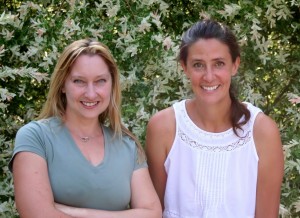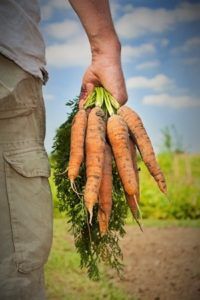
I met Dr. Daniela Connelly, an MD and organic farmer, at the Harvard Medical School’s CME publishing course this spring. Since then, I’ve been advising her and co-author, Laura Wolfer, on their book proposal and platform building.
The authors recently e-mailed with a new twist in their book writing journey–they’re crowdfunding research on microbes and the microbiome, a hot topic in science nowadays. Now, I’ve advised authors about crowdfunding in the past because it’s a great way to build community, create buzz for the book early on and also fund your publishing costs–from editing to book cover and design to marketing the book. However, the idea of funding research to support developing the content of the book was new to me.
To understand more about the idea and the authors’ strategy, however, let’s start with the Microbiome, since that’s the focus of the research and the book.
Lisa: Can you say a bit about the Microbiome, what it is and why we should care?
Daniela: The Microbiome is the collective of millions of bacteria and other microscopic organisms that inhabit every surface of our body (inside and out). Only a few years ago, their diversity and number were not well understood because culturing these organisms was not feasible. Now the technology is there to identify and characterize each bacterium.
The Microbiome as a whole participates in many key functions in our body. In the gut, it breaks down our food and makes nutrients available to us. It even signals our metabolism what to do with those calories (store as fat or expend as energy). Bacteria in the gut (known as the gut flora) protect the lining of our intestines from infections by disease causing organisms, but also from inappropriate immunologic responses that can cause food allergies. Deficiencies or changes in the Microbiome have been associated with inflammation, obesity and autism, among other conditions. This is a vast and very exciting new realm of science. Just when we thought most frontiers were conquered, a new one appears and it’s something we carry with us all our lives!
Lisa: Why does the Microbiome interest you as an organic farmer and MD?
 Daniela: I came to the Microbiome not from a medical point of view but rather from an agricultural one. In the process of establishing an organic apple orchard, I researched the mechanisms by which a plant can become more resilient to disease and insect attack. It’s all about optimal biological equilibrium in the soil and on the plant. There is no one agricultural chemical that applied will improve upon an optimal microbiological state. In this sense, the plant can only be as strong and healthy as the soil it stands in.
Daniela: I came to the Microbiome not from a medical point of view but rather from an agricultural one. In the process of establishing an organic apple orchard, I researched the mechanisms by which a plant can become more resilient to disease and insect attack. It’s all about optimal biological equilibrium in the soil and on the plant. There is no one agricultural chemical that applied will improve upon an optimal microbiological state. In this sense, the plant can only be as strong and healthy as the soil it stands in.
In modern medicine, physicians often take a similar attitude to conventional farmers: thinking we can enhance health or fight chronic disease by adding chemicals to our bodies–when really, what the body needs are all the vital building blocks for self-repair and defense. By this I mean optimal nutrition and a Microbiome that delivers us key nutrients and protects us from infections and inflammation. Laura and I, both scientists but also organic farmers, want to explore the parallels between the soil Microbiome and gut microbiome. We believe the intersection of disciplines is where the fun happens!
Lisa: Why did you and Laura Wolfer decide to do this experiment?
Daniela: The information we needed to weave the thread of soil, plant and gut health wasn’t yet fully available. Adequate diversity of bacteria in the soil and in the gut is the key to disease resiliency. But what connects the both? The food we eat and the environment it’s produced in…We needed a very specific question answered – do organic fruits and vegetables hold a greater biological diversity than conventional produce? Laura and I are not affiliated with an academic institution, and so we turned to crowdfunding. What a fantastically hip, democratic and independent way to fund research that might otherwise be overlooked!
Lisa: How do you think the experiment will help you with the book?
Daniela: Laura and I had little experience with, or exposure on, social media. At the start, our platforms were not exactly enviable! Laura has been diligent about expanding her blogging (cultivateyournature.com) and I, as much as I thought I’d be a great blogger, simply don’t have the time to engage in this consistently. I work full time as an MD, have a busy farm to run and have a slew of kids (human and caprine) to shuffle. Our crowd-funded experiment, however, has the potential to increase our platform and media presence. The results can be presented at conferences, can be blogged, and the results can add to the discussion about the health benefits of organic foods. Certainly a hot topic…
But more than a tool for self-promotion (or even book promotion), generating new data around the microbiome feels very authentic to us. Research is something that Laura and I have been trained in, and it’s very gratifying to generate our own data and not just refer to other people’s research!
Lisa: Do you plan to blog during the experiment as a way to build a community?
Daniela: I wish I could say we premeditated our every move; that we had a strategic (blogging) plan all along but rather, we’re improvising as we go… The crowdfunding site has a space for so called “lab notes” that functions very much like a blog and we will put those to good use! Laura will continue to blog on her site.
Lisa: How do you envision the experiment supporting the book?
Daniela: To some degree it validates the authors as scientists; strengthening our professional platform vis-à-vis agents and publishers. On an important, personal level however, the experiment contributes to our platform and media presence in a way that feels very natural and authentic to Laura and me. It also underscores the concept that where disciplines overlap, like ripples of water merging, paradigms can be shifted and reshaped and this will be elaborated upon in the book.
You can find out more about Daniela’s and Laura’s Microbiome experiment here. Perhaps you’d even like to participate as a funder, as I did.
Daniela’s last request: “Please, don’t hold back, like us, tweet us and supports us on this crazy journey.” And, please, ask your questions below as a comment, as well.



I asked a question about when you finish writing a book how you go about getting it Published. You told me to write it on your blog which I did. Nobody replied and I wrote to you that nobody did reply. You told me to rewrite it and I did. Yet still no one replied. I don’t know what else to do with your site since I’m not getting an answer.
Hi Antoinette,
I’ve checked through all comments and this is the first one that came through. Not sure why, but that’s why you have not gotten a response. I am happy to answer your question. Here’s the question you e-mailed me:
“A question that I need answered is….. after finishing your book, how do I go about getting it published. I have only come across places that want me to pay for exposure. Can you point me in the right direction to get my book published where I can have a publisher read it and if they like it they will publish it.”
It sounds like you are looking for a traditional publisher. For that you will need a query letter and book proposal. For nonfiction, I recommend the book How to Write a Book Proposal by Michael Larsen. For fiction, Your Novel Proposal: From Creation to Contract by Blythe Camenson and Marshall J. Cook. However, be aware that most traditional publishers expect you to have a following, what we call “author platform.” If you are not able to develop a significant platform, or would rather get the book out there to build your following and online community, then I do suggest you self-publish. There is always some money involved in self-publishing since you need an editor, proofreader, designer for layout and cover and ISBN number. While I do not like Amazon’s tactics, it often behooves a writer to publish with their self publishing arm (CreateSpace) since they give preference to books published with CreateSpace.